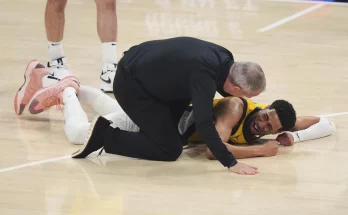Patrick Peterson Comes Home to Retire a Cardinal: A Legendary Cornerback’s Journey Comes Full Circle
In a move that brought smiles to the faces of Arizona Cardinals fans and NFL nostalgists alike, eight-time Pro Bowl cornerback Patrick Peterson has officially signed a one-day contract to retire as a member of the franchise where it all began. One of the most electrifying defensive backs of his generation, Peterson’s career spanned over a decade and left an indelible mark on the NFL. Now, as he steps away from the game for good, Peterson’s decision to retire as a Cardinal feels not just sentimental, but symbolic—a full-circle moment for a player whose loyalty, athleticism, and consistency defined an era of football in the desert.
A First-Round Gamble That Paid Off
The Arizona Cardinals selected Patrick Peterson with the fifth overall pick in the 2011 NFL Draft out of LSU, where he had established himself as a physical, fast, and fundamentally dominant cornerback. At LSU, Peterson was a consensus All-American and winner of both the Chuck Bednarik Award and the Jim Thorpe Award—honors bestowed upon the nation’s top defender and top defensive back, respectively. His collegiate résumé made him an easy first-round choice, but few could have predicted just how quickly Peterson would adapt to the professional level.
From the moment he stepped onto the field, Peterson was a game-changer—not only at cornerback but also as a return specialist. As a rookie, he tied an NFL record with four punt return touchdowns in a single season, including a dazzling 99-yard overtime return to beat the Rams, which remains one of the most iconic plays in Cardinals history.
Dominance in the Desert
Peterson’s NFL career took off with a vengeance. Between 2011 and 2020, he was named to eight Pro Bowls and was a three-time First-Team All-Pro. He was known for his ability to shut down top receivers, his elite ball skills, and his uncanny anticipation on routes. In an era where defensive backs were constantly tested by high-octane offenses and elite quarterbacks, Peterson thrived.
Quarterbacks soon learned that throwing to Peterson’s side was a gamble rarely worth taking. His blend of speed, strength, and football IQ made him a nightmare for wide receivers. Whether he was shadowing Calvin Johnson, Odell Beckham Jr., or Julio Jones, Peterson was a consistent force on the perimeter.
But it wasn’t just his on-field production that endeared him to fans—it was his poise, leadership, and unflinching dedication to his craft. Peterson played through injuries, adapted to scheme changes, and led by example in the locker room. His durability was unmatched; he started 154 games during his 10-year run with the Cardinals, missing very few due to injury.
More Than Just a Cornerback
Peterson’s value extended beyond his statistics. He was a team captain and a mentor to younger players. He was the face of the Cardinals defense during a decade that saw the team transition from perennial underdog to legitimate playoff contender. While the franchise experienced its fair share of ups and downs, Peterson remained a constant—a beacon of professionalism and talent.
His ability to play man coverage, press at the line of scrimmage, and recover when beaten made him a rare prototype in the NFL. Even more impressively, Peterson never relied solely on his natural athleticism. As the years went by, he refined his technique, studied more film, and adapted his game to suit the evolving league.
Moving On: Vikings, Steelers, and the Later Years
In 2021, Peterson signed with the Minnesota Vikings, signaling the end of his Cardinals tenure. While some fans were heartbroken to see him in a different uniform, Peterson approached the next phase of his career with the same tenacity he brought to Arizona. He played two seasons in Minnesota, where he served as both a contributor and a mentor to a young Vikings secondary.
In 2023, Peterson moved on to the Pittsburgh Steelers. Though no longer the shutdown corner of his prime, he brought a veteran presence to a team rich in defensive history. Even as Father Time caught up with his speed, Peterson’s mind and instincts continued to set him apart. He logged several key interceptions and defended critical passes that reminded fans he still had plenty left in the tank.
Still, Peterson had always envisioned returning home to Arizona to finish his career. That dream became reality when he and the Cardinals announced that he would sign a one-day contract to retire as a Cardinal—a poetic ending to a brilliant career.
A Return to the Red Sea
When Peterson returned to the Cardinals facility to officially sign his retirement contract, it was clear that the moment was emotional. The franchise welcomed him with open arms. Cardinals owner Michael Bidwill called Peterson “one of the greatest Cardinals of all time,” while General Manager Monti Ossenfort praised his impact on the game and on the franchise.
Peterson, ever composed but clearly moved, spoke about the moment with humility. “I gave everything I had to this organization and this fanbase. To come back and retire as an Arizona Cardinal—it means everything. This is home,” he said.
Fans flooded social media with their appreciation, recalling memories of his punt return magic, his lockdown coverage, and his role in big games. Many cited his 2015 season—perhaps his finest—as a highlight, when he helped lead the Cardinals to a 13-3 record and a trip to the NFC Championship Game.
A Hall of Fame Legacy?
The question now becomes: Is Patrick Peterson a Hall of Famer? The answer for most football minds is a resounding yes. His 34 career interceptions, eight Pro Bowls, and three All-Pro selections place him in elite company. His dominance as a return man in his early years only enhances his legacy.
Statistically, Peterson compares favorably to other recent Hall of Fame inductees like Champ Bailey, Ronde Barber, and Ty Law. His longevity, versatility, and sustained excellence are virtually unmatched. More than numbers, however, is the reputation Peterson built—a reputation as a true professional and a cornerstone player.
NFL insiders expect Peterson to be a serious contender for induction once eligible, and if selected, it’s likely he’ll go in wearing Cardinals red.
Impact Off the Field
Peterson’s influence wasn’t limited to just football. He was active in the community, launching the “Patrick Peterson Foundation for Success,” which helps underprivileged youth build better futures through education and mentorship. In Arizona, he was a frequent presence at charity events, school visits, and youth football camps.
His commitment to philanthropy mirrored his dedication to the game. In a league where headlines are often dominated by controversy, Peterson represented stability and excellence, on and off the field.
Final Reflections: The Man in the Mirror
Now retired, Peterson looks forward to spending more time with his family and exploring opportunities in broadcasting and coaching. He’s already had stints as a guest analyst and has expressed interest in mentoring young defensive backs. He’s also teased the possibility of one day working in a front office role, bringing his knowledge of the game to team-building and player development.
As he walked out of the Cardinals facility for the final time as a player, Peterson left behind a legacy that can’t be measured in stats alone. He leaves behind inspiration. He leaves behind a blueprint for how to play the cornerback position with class, confidence, and commitment.



